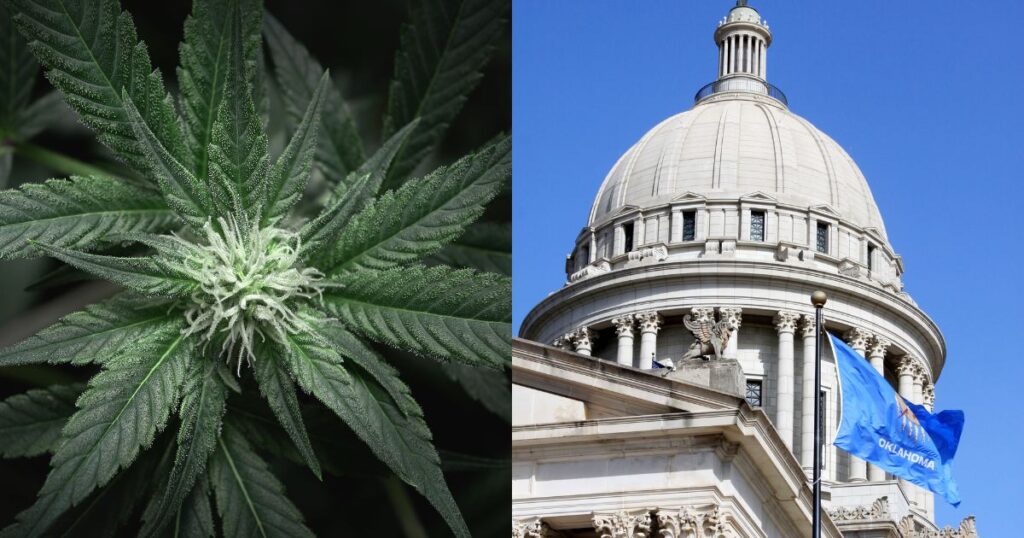Oklahoma’s cannabis industry is heating up once again, offering a mix of opportunity, regulatory challenges, and debate. On one side, a group advocating for adult-use cannabis has introduced a new drafted constitutional amendment—State Question 837—that could legalize recreational marijuana for adults 21 and older. On the other hand, state lawmakers and enforcement agencies are pledging to clamp down on perceived issues within the cannabis industry, including overproduction and illicit market activity.
A New Push for Recreational Cannabis in Oklahoma
Oklahoma has had medical marijuana since voters legalized it in 2018. The state’s relatively permissive licensing structure resulted in an explosion of cannabis businesses, and by 2023, Oklahoma had the most dispensaries per capita in the United States. However, adult-use or “recreational” cannabis remains illegal—though proponents are working to change that, yet again.
The organization Oklahomans for Responsible Cannabis Action (ORCA), one of the state’s most established cannabis advocacy groups, has filed a proposed constitutional amendment to legalize recreational cannabis, as first reported by The Oklahoman. Known as State Question 837 (SQ 837), the initiative would allow adults aged 21 and over to purchase and use cannabis without needing a medical license.
If passed, SQ 837 would:
- Preserve the existing medical marijuana system, allowing patient cardholders to continue benefiting from reduced tax rates on cannabis products.
- Introduce a new 10% excise tax on recreational cannabis purchases, with revenue earmarked for the state, counties, cities, and other civic initiatives.
- Prohibit authorities from assuming marijuana intoxication based solely on THC presence in someone’s system, focusing instead on cognitive or behavioral impairment evaluation.
- Enable recreational cannabis sales within 60 days of legalization, with home delivery systems launching shortly thereafter.
However, getting this question on the ballot won’t be simple. At least 172,993 signatures from registered voters must be gathered, potentially under new legislative limits that further complicate signature collection.
After a failed attempt to pass State Question 820 in March 2023, along with other attempts that didn’t make it to the ballot, advocates for SQ 837 are framing this amendment as more comprehensive and voter-responsive. ORCA director Jed Green has criticized previous efforts, saying they imported out-of-state interests while creating unnecessary bureaucratic redundancy. ORCA promises a new, more streamlined blueprint in SQ 837, aligned with the lessons learned during earlier campaigns.
Simultaneous Stricter Regulations for Oklahoma’s Cannabis Industry
While the push towards legalization is once again gaining momentum, Oklahoma lawmakers are doubling down in the opposite direction. State leaders have talked about increasing concerns over the cannabis industry’s role in overproduction, illicit use, and criminal activity.
The Texoma High-Intensity Drug Trafficking Area (HIDTA) recently published a report revealing what they say is substantial overproduction within Oklahoma’s cannabis industry. According to their findings, the state is producing more than 30 times the marijuana required to meet consumer demand among licensed medical marijuana patients. This surplus, they argue, is fueling the illicit market within and beyond state borders.
Legislators are responding with plans to tighten the screws on cannabis businesses. These include advancing stricter laws targeting licensure, inventory tracking, and inspection enforcement, according to KOCO News. Over recent years, rules have already become more stringent, with new measures such as extending timeframes for legal challenges against petition drives and imposing rigid signature matching requirements.
A Complex Regulatory Climate
The push for stricter industry oversight has created tension with many cannabis entrepreneurs and advocates in Oklahoma, who believe such actions punish law-abiding businesses rather than curbing illicit activity. Critics argue that much of the “chaos” in the Oklahoma cannabis market stems not from legalization itself, but from the state’s initial lenient approach to regulation when the medical marijuana law was first introduced.
For example, Oklahoma has more than 7,000 licensed cannabis businesses—an outsized number for the state’s population. This was the result of state policies deliberately lowering barriers to entry for hopeful cannabis entrepreneurs. Yet many fear that new, restrictive legislation could drive smaller businesses out of the market, paving the way for larger operators or out-of-state companies to monopolize the industry.
Organizations like ORCA are prepared to legally challenge any legislation they deem harmful to voting rights or fair business practices. Speaking on one such proposal that imposes limits on signature collection for ballot initiatives, Jed Green called it “a dangerous infringement on Oklahomans’ democratic and constitutional rights.”
Meanwhile, evidence from other states refutes the argument for stricter regulation. Findings from legalized adult-use cannabis markets such as Colorado and Washington often contradict the narrative that cannabis legalization just leads to higher crime or greater social ills. Instead, research shows that legalization, coupled with strong but fair regulatory oversight, reduces illegal activity and generates significant tax revenue for states.
The Future of Cannabis in Oklahoma
Oklahoma finds itself at a crossroads as it balances competing pressures to legalize cannabis more broadly while also enacting stricter oversight of the industry. On one hand, State Question 837 represents a chance for voters to expand cannabis access and modernize its framework to reflect adult-use principles. On the other, new enforcement measures risk undermining legal operators who have worked hard to comply with the state’s regulatory environment.
Ultimately, the success or failure of both initiatives—SQ 837 and heightened compliance measures—will depend heavily on how informed and engaged the public remains in this debate. States around the U.S. have demonstrated that a well-regulated cannabis market is not only possible but capable of generating economic and social benefits when implemented responsibly.
For Oklahomans, the potential for legalizing adult-use cannabis could mean expanded freedoms and economic opportunities. However, without thoughtful regulations that prioritize fairness and accountability, the market may continue to be marred by inefficiencies and tensions.
















